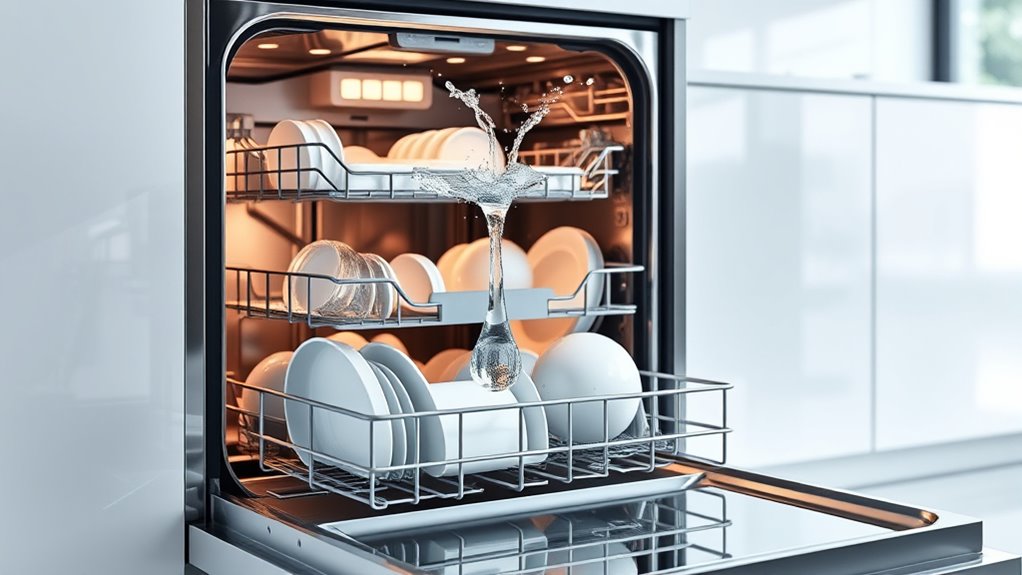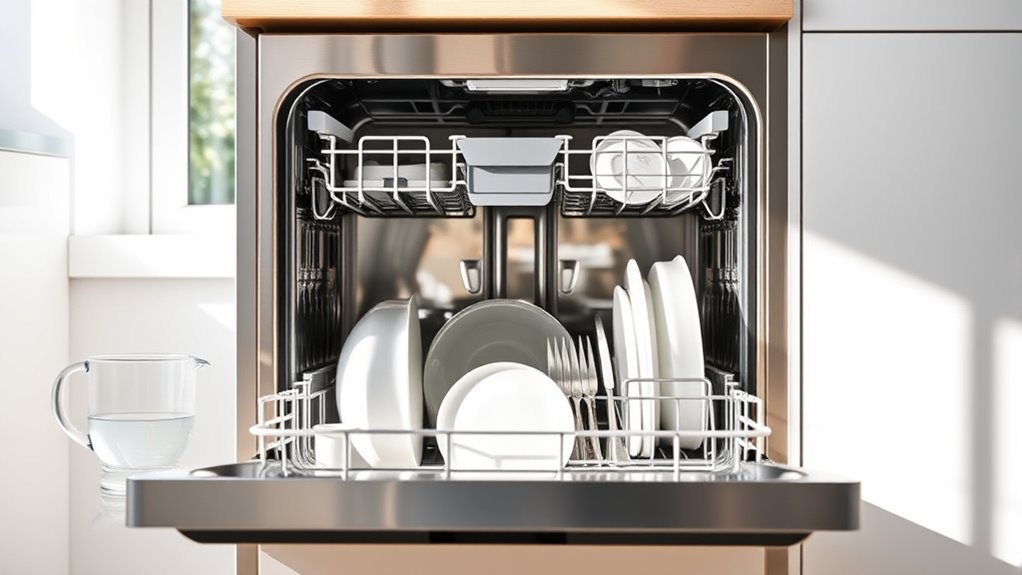Most new dishwasher models are much more water-efficient than older ones, using advanced sensors to adjust water flow based on load dirtiness. They also save energy, often earning ENERGY STAR certifications, which helps lower your utility bills. These modern appliances are built for durability and easy maintenance, reducing long-term costs. If you want to learn how these features can benefit you and compare models, there’s more to discover about the latest innovations.
Key Takeaways
- Modern dishwashers use significantly less water per cycle than older models thanks to advanced sensors and optimized technology.
- Newer models often feature water-saving modes that adjust water levels based on load dirtiness.
- ENERGY STAR certified dishwashers combine water and energy efficiency, reducing overall household water usage.
- Improved design and maintenance features increase durability, minimizing leaks and water waste over time.
- Overall, new dishwashers are more eco-friendly and cost-effective due to reduced water consumption and operational costs.

Have you ever wondered how much water your dishwasher uses per cycle? It’s a common question, especially when you’re trying to cut down on your household expenses and reduce your environmental impact. Modern dishwashers are designed to be more water-efficient, which means they can save you money in both water bills and energy costs. When you opt for newer models, you often see significant improvements not just in water consumption but also in energy savings, since many appliances now incorporate advanced technology to optimize performance. This means you get cleaner dishes while using less water and electricity, making your household more eco-friendly and cost-effective.
But it’s not just about the water savings. Newer dishwashers tend to require less maintenance over time, which can lower your overall maintenance costs. Older models often develop issues such as clogged spray arms or inefficient drainage systems, which can lead to higher repair bills. Modern dishwashers are built with better materials and smarter designs that make them more durable and easier to maintain. For example, many newer models feature self-cleaning filters or simplified parts that are less prone to breaking down. This reduces the need for frequent repairs and prolongs the lifespan of the appliance, giving you more value for your investment. Additionally, filter maintenance is less of a concern with modern designs, contributing to their efficiency and longevity.
In addition, newer dishwasher models are equipped with sensors that detect how dirty the dishes are and adjust water usage accordingly. This means you’re not wasting water on lightly soiled loads, which can be a common issue with older, less sophisticated machines. These sensors help to optimize water and energy use, ensuring that each cycle is as efficient as possible. As a result, you’ll notice a decrease in your utility bills and a reduction in the environmental footprint of your household. Plus, with fewer repairs and less frequent replacements needed, you’ll spend less on maintenance costs over the years.
Another benefit of upgrading to a newer dishwasher is the peace of mind that comes with better safety features and energy ratings. Many new models have earned ENERGY STAR certification, indicating they meet strict standards for energy efficiency. This not only helps the environment but also translates to tangible savings for you. In the end, investing in a modern dishwasher can be a smart move for your wallet and the planet, especially if you’re looking to improve your household’s overall efficiency. So, next time you’re considering a replacement, remember that new models are designed to be more water- and energy-efficient, which means lower maintenance costs and greater savings in the long run.
Frequently Asked Questions
Do Energy-Efficient Dishwashers Clean Dishes as Well as Older Models?
You might wonder if energy-efficient dishwashers match older models in cleaning performance. The good news is, many newer, efficient dishwashers are designed with advanced technology that enhances cleaning effectiveness. They often have better spray arms, sensors, and cycles to guarantee your dishes come out spotless. So, you can enjoy eco-friendly operation without sacrificing cleaning power, making modern dishwashers a smart choice for both effectiveness and savings.
How Much Water Can I Save by Switching to a New Dishwasher?
Switching to a new dishwasher can save you quite a bit of water, especially if you follow proper maintenance and water-saving tips. Modern models use considerably less water per cycle, often around 3-4 gallons, compared to older ones. To maximize savings, keep your dishwasher in good condition and run full loads. This way, you’ll use less water and energy, making your household more efficient and eco-friendly.
Are There Specific Brands Known for the Most Water-Efficient Dishwashers?
Thinking about which brands are known for water-efficient dishwashers is like finding a needle in a haystack. You should look for brands with a solid reputation that prioritize water-saving features, such as ENERGY STAR certifications or eco-friendly cycles. Brands like Bosch, Miele, and Samsung often lead in water efficiency. By choosing these, you’ll likely get a model that saves water while cleaning effectively.
Do Dishwasher Cycle Options Affect Overall Water Consumption?
Cycle options and load size directly impact your dishwasher’s water consumption. When you customize cycles, choosing eco-friendly or shorter options can reduce water use. Adjusting load size guarantees you’re not using excess water on smaller loads. By paying attention to cycle customization and load size, you can save water without sacrificing cleaning power. Always select the most appropriate cycle for your load to optimize efficiency and conserve resources.
How Often Should I Run My Dishwasher to Optimize Water Usage?
To optimize water usage, you should run your dishwasher only when it’s full, avoiding multiple partial loads. Regular dishwasher maintenance, like cleaning filters, guarantees efficient operation. Using water recycling features, if available, can further reduce water consumption. By doing so, you minimize waste, save resources, and keep your appliance running smoothly. Proper cycle choices also help, but focusing on full loads and maintenance is key.
Conclusion
Did you know that modern dishwashers use up to 40% less water than older models? That means you can save both money and the environment with a new, efficient dishwasher. By choosing a recent model, you’re not just getting cleaner dishes faster—you’re also making a smart choice for water conservation. So, next time you’re shopping for appliances, consider upgrading to a water-wise dishwasher and make a real difference in your daily water footprint.









